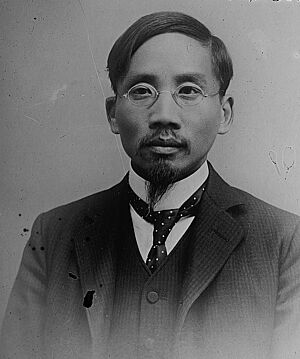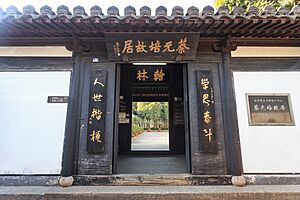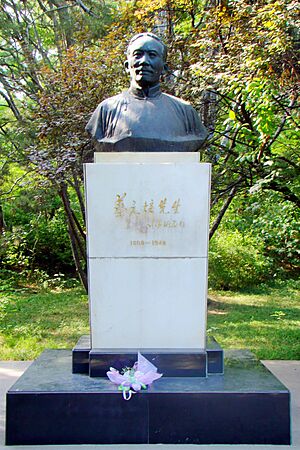Cai Yuanpei facts for kids
Quick facts for kids
Cai Yuanpei
|
|||||||||||||
|---|---|---|---|---|---|---|---|---|---|---|---|---|---|
 |
|||||||||||||
| President of the Control Yuan | |||||||||||||
| In office 1928–1929 |
|||||||||||||
| Preceded by | Office established | ||||||||||||
| Succeeded by | Zhao Daiwen | ||||||||||||
| President of the Academia Sinica | |||||||||||||
| Preceded by | Office established | ||||||||||||
| Succeeded by | Zhu Jiahua | ||||||||||||
| Personal details | |||||||||||||
| Born | 11 January 1868 Shaoxing, Zhejiang, Qing dynasty |
||||||||||||
| Died | March 5, 1940 (aged 72) British Hong Kong |
||||||||||||
| Spouses |
|
||||||||||||
| Children | 7 (including Cai Weilian) | ||||||||||||
| Parent | Cai Guang (father) | ||||||||||||
| Alma mater | Leipzig University | ||||||||||||
| Occupation | Philosopher, politician | ||||||||||||
| Chinese name | |||||||||||||
| Chinese | 蔡元培 | ||||||||||||
|
|||||||||||||
| Courtesy name | |||||||||||||
| Traditional Chinese | 鶴卿 | ||||||||||||
| Simplified Chinese | 鹤卿 | ||||||||||||
|
|||||||||||||
| Second alternative Chinese name | |||||||||||||
| Chinese | 孑民 | ||||||||||||
| Literal meaning | Lone Citizen | ||||||||||||
|
|||||||||||||
Cai Yuanpei (Chinese: 蔡元培; 1868–1940) was a very important Chinese thinker and politician. He helped shape modern education in China. He was known for his ideas about education reform and for combining Chinese and Western ways of thinking. He served as the president of Peking University and founded the Academia Sinica, a top research institution. Cai Yuanpei was also involved in major social changes like the New Culture and May Fourth Movement, and he supported the feminist movement.
Contents
Cai Yuanpei's Life Story
Cai Yuanpei was born in Shaoxing, Zhejiang province. When he was 26, he joined the Hanlin Academy, which was a special group of scholars in the government. In 1898, he started working in education. He became the leader of several schools, including the Shaoxing Chinese-Western School and a special class at Nanyang Public School (which is now Shanghai Jiao Tong University).
In 1904, he started a group called Guangfuhui. The next year, he joined the Tongmenghui in Paris, France. This group aimed to overthrow the old Chinese government. He also became part of a Chinese anarchist group. In 1907, he went to Universität Leipzig in Germany to study philosophy, psychology, and art history.
When the new Republic of China was formed in 1912, Cai Yuanpei became the Minister of Education. He believed that movies could be used to help educate the public.
Cai Yuanpei returned to China in 1916. The next year, he became the President of Peking University. He strongly supported a program that sent Chinese students to France to work and study. During his time at Peking University, he invited many famous thinkers to teach there. These included future leaders like Chen Duxiu and Li Dazhao, as well as scholars like Hu Shih and the painter Xu Beihong.
In 1919, students protested in what became known as the May Fourth Movement. When student leaders were arrested, Cai Yuanpei resigned from his position to show his disagreement. He later returned to his role. He also wrote for the Daily University of Peking University about art and other important topics.
After resigning again in 1922, he spent some time in France. He came back to China in 1926 and supported Chiang Kai-shek and the Kuomintang party. He was one of the "Four Elders" of the party. He was made president of the Control Yuan, a government branch, but he soon resigned.
Cai Yuanpei wanted to change China's education system to be more like France's. In 1927, he helped start the National College of Music, which is now the Shanghai Conservatory of Music. In 1928, he helped create and became the first president of the Academia Sinica, a leading research academy. He also helped start the China League for Civil Rights. This group criticized the government for misusing its power. After a friend and colleague was killed, Cai Yuanpei spoke out against the government's actions and then retired from public life.
In 1937, when the war with Japan started, Cai Yuanpei moved to British Hong Kong because of his health. He lived there quietly until he passed away in March 1940 at the age of 72.
How Cai Yuanpei Changed Education
Cai Yuanpei had a huge impact on Chinese education and culture, especially through his work at Peking University. He helped establish the Ministry of Education in 1927, which was based on the French education system.
Aesthetic Education
Cai Yuanpei strongly believed in and promoted "aesthetic education." This means teaching people to appreciate beauty and art. He thought that learning about art and beauty was important for building good character and for creating a stable society. He believed it helped people develop "public morality and civic virtue."
Women's Education
Cai Yuanpei worked to give women more equal opportunities in education. In 1920, Peking University started admitting women for the first time, and he supported mixed-sex education. He also encouraged feminism to change old ideas about women in China. He invited important feminists like Chen Duxiu and Hu Shih to teach at Peking University. This was a big step forward for women's education in China.
Cai Yuanpei's Teaching Ideas
Education Should Be Independent
Cai Yuanpei believed that education should be separate from government control. He wrote in the journal New Education that schools and universities should be free to make their own decisions without direct interference from the government. He wanted to protect the freedom of teachers and students.
Freedom and Democracy in Learning
Cai Yuanpei wanted to create a place where people could study freely and openly at Peking University. He brought together many different thinkers, including those with new ideas like Li Dazhao and Hu Shih, and also more traditional scholars like Gu Hongming. He believed in academic freedom, which means teachers and students should be free to explore and discuss ideas without fear.
Five Types of Education
Cai Yuanpei suggested that education should include five main areas:
- Military education for citizens, to prepare them for national defense.
- Utilitarian education, which focuses on practical skills and knowledge.
- Civic education, to teach people about their duties as good citizens.
- Education for a world view, to help students understand the world around them.
- Aesthetic education, to develop an appreciation for beauty and art.
Cai Yuanpei's Other Ideas
Thoughts on Women
Cai Yuanpei had a mix of traditional and modern views about women. While he believed in some traditional roles, he strongly supported women's rights to divorce and remarry. He was also against harmful practices like foot binding and having multiple wives (concubinage). He pushed for equal education and physical education for women.
Political Ideas
Cai Yuanpei was interested in anarchism, which is a political idea that believes in no government or rulers. He thought it could help China overcome foreign control and rebuild its civilization. He was influenced by thinkers like Pierre-Joseph Proudhon and Peter Kropotkin. His ideas about anarchism mostly focused on ending the colonial control China was facing.
The May Fourth Movement
During the May Fourth Movement, a time of great change in China, Cai Yuanpei, along with Chen Duxiu and Hu Shih, shared their ideas on social values. Cai Yuanpei believed that China could create a "new civil religion" by teaching people about aesthetics, democracy, and science. This would help solve the problems China faced after the 1911 Revolution.
Important Writings
"New Year's Dream"
"New Year's Dream" (新年梦) is a short story written by Cai Yuanpei. It is based on his own life and shows his ideas for an ideal society. The story is about a Chinese citizen talking about China's revolution in the 20th century. Cai wrote this story when China was at war with Japan, and it also shows the influence of the Russo-Japanese War.
See also
- Chinese Education Improving Institute
- History of education in China
- New Culture Movement
- Anarchism in China
Images for kids




